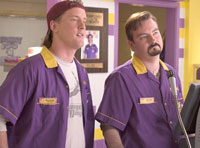“Doctor Sleep” is a sequel to Stanley Kubrick's 1980 horror classic, “The Shining.” Both films are based on Stephen King novels, also separated by decades. (King published The Shining in 1977, and Doctor Sleep in 2013.) I would strongly urge a person to watch “The Shining” before reading this review or watching “Doctor Sleep.” Both this film and the next paragraphs will contain spoilers for the first film, which is a masterpiece, and you don't want to spoil it!
You may recall that the first film introduced us to 5-year-old Danny Torrance, whose psychic abilities made him see horrifying visions at the haunted Overlook Hotel and helped him survive his psychotic, alcoholic father (Jack Nicholson). Those psychic powers were described as “the shine” by Overlook chef Dick Hallorann (originally played by Scatman Crothers, and now by Carl Lumbly). In “Doctor Sleep,” we find that, unsurprisingly, Danny (Ewan Mcgregor) is scarred by the experience, and he is haunted by ghosts from the Overlook. Even with help from Hallorann's ghost, Danny grows into a broken, alcoholic man. He finally joins AA, gets his life together, and finds meaning as a hospice worker. His psychic abilities help him comfort the dying patients, who nickname him Dr. Sleep.
Meanwhile, Danny becomes aware of a coven of fellow psychics who have learned to extend their lives to near-immortality by hunting and feeding on the “shine” from people like himself. Calling themselves the True Knot, these psychic vampires are led by Sally the Hat (Rebecca Ferguson, from “Dune”). They set their sights on a gifted, young girl (Kyliegh Curran), and Danny must overcome his fears and marshal all of his shine to help her.
Screenwriter and director Mike Flanagan found himself in the position of making a movie based on a novel, but which was expected to be a sequel to a film that differed significantly from the first novel. Stephen King famously disapproved of Kubrick's “The Shining” adaptation, and while I think King's complaints were overblown, the plot differences from the novel were significant enough to create challenges with this sequel. Flanagan managed to thread the needle by maintaining continuity with the Kubrick film while reaching back to the source material to revive some of those King elements that were lost the first time around. He did so well enough to satisfy King himself, who said of the film, “Everything that I ever disliked about the Kubrick version of 'The Shining' is redeemed for me here.”
Stephen King's opinions notwithstanding, Kubrick's “The Shining” is a masterpiece, and “Doctor Sleep” does not quite rise to that level. It's a damn good movie, though, and among the best film adaptations of King novels. Like “The Shining,” it runs long, about 2 ½ hours, but it doesn't feel long. The cast is excellent, especially the gorgeous Rebecca Ferguson, who simply dominates the screen every time she appears. The pacing of the narrative rarely drags, with just a few scenes that felt extraneous, and if the film runs long, it is because there is a lot of story here. In truth, I wouldn't have minded even a bit more information about the True Knot. They may be evil, but they are an intriguing group of near-immortals who, as Sally the Hat says, have “seen empires rise and fall.” I guess that's incentive to read the book!
4 stars out of 5







